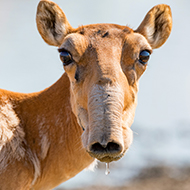
The saiga antelope population in Kazakhstan has risen to 842,000.
The rare saiga antelope has made a comeback, as numbers have more than doubled since 2019, as reported by the BBC.
The saiga has reemerged in Kazakhstan, after a mass die-off in 2015 caused worry surrounding the future of the species, however, following conservation measures put in place by the Kazakh government, the species have begun their return from the brink of endangerment.
Albert Salemgareyev, from the Association for the Conservation of Biodiversity of Kazakhstan, told BBC News that saigas can: “give birth to twins every year, which gives high potential for the species to quickly recover." This has been a key factor in their comeback, as this allows the species to grow at a fast rate, alongside the conservation measures, such as a poaching ban.
The most recent survey was carried out in April 2021, and displayed both a big increase in numbers generally, and particularly in Ustyurt in south Kazakhstan.
As the BBC reports, Fauna and Flora International, a UK non-profit organisation, has been involved in efforts to protect the saiga in Ustyurt, putting together an anti-poaching ranger team and also monitoring Saiga movements using satellite collaring.
FFL senior programme manager for Central Asia, Favid Gill, told BBC News: There are few truly vast wildernesses, like the steppes of central Asia, left on the planet. To know that saiga herds are still traversing them in their thousands, as they have done since prehistoric times, is an encouraging thought for those of us who want those wildernesses to remain."
Image © Shutterstock



 Joanne Webster, a professor of parasitic diseases at the RVC, has been elected as a Fellow of the Royal Society (FRS).
Joanne Webster, a professor of parasitic diseases at the RVC, has been elected as a Fellow of the Royal Society (FRS).